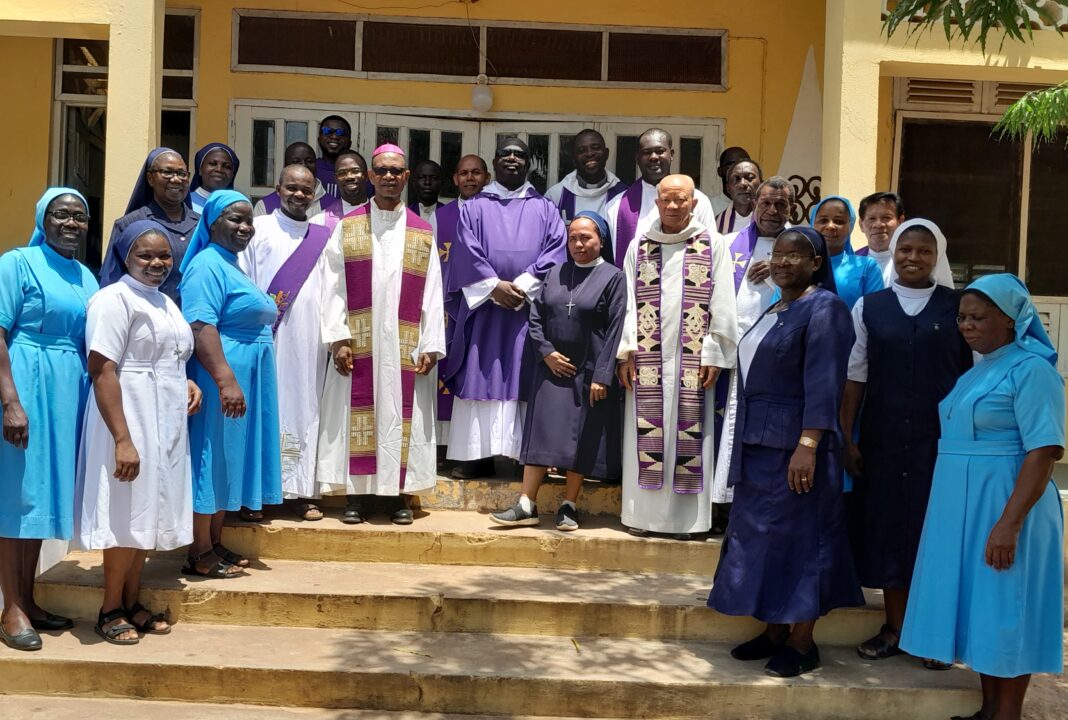Rev. Fr. Philip Gyapong, a Priest of the Donkorkrom Apostolic Vicariate has preached on the theme: “Bless me Father for I have sinned” to Priests and Religious of the Vicariate during their Lenten Recollection on Saturday, March 16, 2024.
A batch of 14 Priests including the Most Rev. John Alphonse Asiedu SVD, Bishop of the Apostolic Vicariate of Donkorkrom, two Deacons and 11 Religious Women converged in the Small Chapel at St. Francis Xavier Cathedral for the Recollection.
The talk of the day centred on what happens at the Confessional and the disposition of the sinner to receive the grace of God.
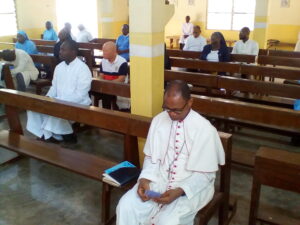
Fr. Gyapong confessed to have borrowed the theme of his reflection from his former Bishop, Kumodji, which according to him, made a lot of sense and threw him into deep reflection, as he pondered: ‘why not forgive me Father for I have sinned, but rather ‘bless me Father for I have sinned’ as happens at the confessional?
The word ‘blessing’ he intimated could mean ‘happiness’, ‘praises’, ‘thanksgiving’, so why would one who has sinned be asking for the Father’s blessings rather than forgiveness? He referred to Gen 3 – the fall of Man, where even though Man disobeyed God, He was still searching and calling out for him – ‘Adam, where are you?’
This instance, he said, gives an idea of a God who not only forgives, but goes in search of the offender. This nature of God, he added, gives one the power and the confidence to begin and end the period of Lent with courage.
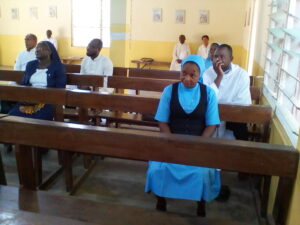
Again, Fr. Gyapongreferred his audience to Luke 18:13, the story of the tax collector who stood at a distance and said ‘Lord be merciful to me a sinner’ and to the famous story of the Lost Son, or the Prodigal Son or the Merciful Father in Luke 15: 18-20 where the prodigal son resolves to go back to his father and ask for forgiveness.
He stressed that this homecoming of the prodigal son was actually the basis for coming out with the logo of the Year of Mercy some years ago; that is the image of God carrying the sinner, with the inscription: ‘Misericordes Sicut Pater’ (Merciful as the Father).
Aside from the image of the Year of Mercy, Fr. Gyapong drew the attention of his listeners to the African context with the image of a small child who gets angry at his mother and beats her legs so hard that when his cry reaches its apex, the child embraces the same legs he has been beating and stops crying.
This, to him epitomizes an African child who can do nothing without his/her mother. So too, he continued, humankind can do nothing without God, yet, sinners though they are, God should make them happy, He should give them mercy, He should bless them, for they have nowhere to go; He has the Words of eternal life – no wonder then that the Liturgy puts it as such: ‘bless me Father for I have sinned’.
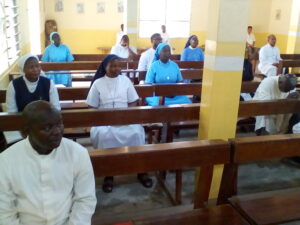
All these images, Fr. Gyapong Pointed out brings to better understanding of the Sacrament of Reconciliation, which some people refer to as the Suffering Sacrament, because many don’t seem to take advantage of it.
He stressed strongly that there is no spiritual gift that can be offered to Mother Church other than to confess one’s sins.
The reason, he said is because the Sacrament is a Liturgical action ministered by the Church of Christ and every sin one commits has physical, personal and social dimensions.
Hence, by confessing one’s sins to God, the person offers a special gift to the Church, by cleaning it and making it pure again.
The speaker underpinned that the effectiveness of the Sacrament of Confession depends on the disposition of the one availing of it and underlined a number of ways by which one can dispose him/herself for the efficacy of the Sacrament, which include: weakness, brokenness, brevity and courage, and fear of sin.
Fr. Gyapong opined that for Priests and Religious to be effective ministers and allow the grace of God to permeate them, they must be willing and ready to admit their weaknesses.
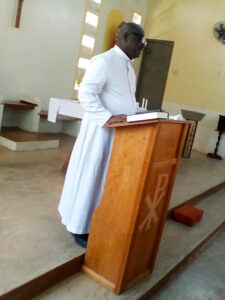
He made reference to Cardinal Antonio Tagle, one time Archbishop of Manella in the Phillipines, who during one of the Ordinations in his Archdiocese asked the Candidates the intriguing but vital question: ‘How weak are you’.
According to him, the whole process of Priestly and Religious Formation is the breaking and refining of the individual, to make them effective in the Mission.
He added that God doesn’t want Angels to be Ministers; He wants human beings – broken people, who can be refined into better and more effective persons.
He underscored that bravity and courage are equally required for one to be disposed to the grace of God: ‘Christianity alone is not for cowards, let alone Religious Life and Priesthood’ he said.
Priests and Religious can’t be prophetic if they are not brave, he added, asking Priests and Religious not to fear Sin. He said without fear, they cannot be effective ministers and the Sacraments they receive will not have the efficacy on them.
He encouraged his Confreres and Sisters to embrace the challenges they encounter in their as part and parcel of the Passion of the Lord, as they anticipate His Resurrection into glory.
Other activities that featured during the day of Recollection were: Holy Mass, Adoration of the Blessed Sacrament, Confessions and Personal Reflections.
By the Department of Social Communications (DEPSOCOM)
Donkorkrom Apostolic Vicariate.

